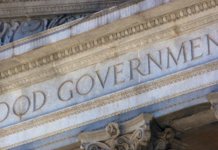We hear these terms bandied about by media and politicians alike (and many pro sports coaches)—transparency and accountability. But what do they mean? Why are they important? How are they pertinent to our political discussions? Let’s dig.
Transparency is defined by Merriam-Webster dictionary as: “the quality that makes something obvious or easy to understand.” From an information standpoint, it is basically clearing up the cloudiness of a particular process—the ability to see clearly what is going on, simplifying the issues as much as possible. This is especially tough for our political dynamic, since many, if not most, important things happen out of public view. If you have a mental image of a smoke-filled room, with several political big-wigs deciding things, you’re on the right track. Back-room deals, out of sight negotiations, and purposely vague descriptions of what got decided and how it happened is exactly the OPPOSITE of transparency. Think of how a particular bill gets created at the Congressional level. As mere low-life voters and concerned citizens (taxpayers), we have no earthly idea of anything about this process. For example, we do not know who wrote the bill—many times, we know who sponsors the bill, but not the real author. And in today’s environment, we usually do not know WHAT is in the bill at all, until it becomes law! You would think that, in today’s Internet Information Age, we would be much better informed into such things. You would be quite wrong. Current bills are so large that understanding them requires a law degree—sometimes many thousands of pages and footnotes! And the last-minute mark-ups and adjustments sometimes happen mere hours before voting on them takes place. There is zero chance that the voting members of Congress have read the things before voting. And if they haven’t read them, there is no opportunity for anyone else to do so either. Again, this is the very opposite of ‘transparency’—it is completely opaque, beyond the view of anyone but the authors, whomever they might be.
Another process that defies transparency: how this administration formulates its policies and positions. In the past, party platforms are discussed in detail in their Conventions. The wording and decisions of what precisely will make up the planks of the platforms were not transparent at all, but the voting of those planks was quite available for anyone watching the Convention. We had a fairly good idea of the public positions of all parties prior to elections—at least, that was the show. How much of that was pure façade and how much was accurate is the subject of speculation. But now? Sheesh. We have no idea how much of this administration’s policies are those of Joe Biden, Jill Biden, a Cabinet member, Nancy Pelosi, Chuck Schumer, an advisor (such as Barak Obama), or other DNC members! The speculation/rumor has always been that Obama is pulling the Biden strings, but I have no first-hand knowledge of such things. Suffice it to say, whatever process is in place for creating policy, transparency is not a high priority or trait of it.
Accountability is defined by Merriam-Webster as: “the quality or state of being accountable”, with ‘accountable’ as “subject to giving an account: ANSWERABLE.” In other words, who is the ultimate person to give credit when things go well, and give true blame when things go poorly. Who is in charge? Who runs or operates a specific area, such that it is their fault and responsibility? In a military sense, it goes up a chain of command: from lower ranks, all the way up to Generals. It is not the private’s fault for following orders, it is the General’s fault for issuing those orders, with a few levels in between, of course. In a political sense, it used to go all the way up to the President when things went wrong. Remember President Harry S. Truman’s statement: “The buck stops here!”? That was exactly its meaning. ‘The buck’ was the responsibility for an action or a policy—Truman took the blame for it, declaring he would not pass ‘the buck’ to anyone else. Fast forward to today. Who is responsible for the policies and actions government does? If you answered the nebulous ‘government’, you have defined the problem. If blame can be spread to many, if not thousands, of individuals, absolutely no one will ever be held accountable for errors, intentional or accidental. Without accountability, the errors will also never be corrected.
For example, consider the disaster of the illegal immigration at the US Southern border. That it is a disaster is unquestioned. Whether it is intentional or accidental may be argued. But more importantly, who do we hold accountable for the decisions made there? What one person can we point to that has allowed for completely disregarding all immigration law, and allowing ‘detainees’ to be bussed or flown to all parts of the US? Who precisely approved the budget to do so? What individual is responsible for creating the process for this to happen? Obviously, we cannot put the blame on Border Patrol or ICE, as they are simply doing whatever they are ordered to do. But who exactly gave those orders? How far up the chain of command does this go?
Let me put it another way: if laws are being broken (and I think they certainly are), whom do we accuse? Who specifically should stand trial? Precisely who should be the defendant in this case? Do we, as citizens, have standing to charge such lawbreaking? Who do we take our case to for prosecution? What court would hear the case? And if the ‘government’ is guilty of lawbreaking, what recourse do we citizens have? I personally do not know the answers to these questions, mainly because of a complete lack of accountability of any of this. My view: the lack of transparency and accountability is quite intentional. They do not want us (taxpayers) to see what they are doing, and they do not want to accept responsibility for doing it. And that, folks, is our single largest problem we face as a nation.
Welcome!Log into your account






















